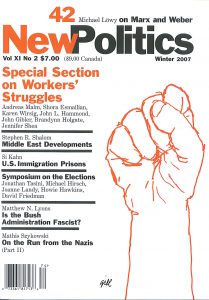Winter 2007 (New Politics Vol. XI, no. 2, Whole Number 42)

From the Editors, Marvin Mandell and Betty Reid Mandell
Middle East Developments, Stephen R. Shalom
Is the Bush Administration Fascist?, Matthew W. Lyons
WORKERS’ STRUGGLES
Iranian Workers Fight Back!, Andreas Malm and Shora Esmalian
CBC Unleashed, Karen Wirsig
The World Social . . .
Read more ›
In spite of their undeniable differences, Marx and Weber have much in common in their understanding of modern capitalism: they both perceive it as a system where "the individuals are ruled by abstractions (Marx), where the impersonal and "thing-like" (Versachlicht) relations replace the personal relations of dependence, and where the accumulation of capital becomes an end in itself, largely irrational.
The following is a slightly expanded text of remarks given at a pre-election debate on the topic, "Is a Progressive Democratic Party Possible." Michael Hirsch, representing the Democratic Socialists of America, spoke for the affirmative, as did Al Ronzoni of Progressive Democrats of America. The negative argument was given by Howie Hawkins of the New York State Green Party and Danny Katch of the International Socialist Organization. The event was held at New York City's Judson Memorial Church on Nov. 3, 2006.
1. Fiddling While Rome Burns
In the U.S. today, psychotherapy, or for that matter any study of the psychodynamics or interpersonal processes involved in mental and emotional difficulties in living, is on the wane. The cause of the decline is the subject here, but to understand it, it must be viewed in the context of the changes to health care in general that have taken place in the past several decades in the U.S.
A country's economic system and its cultural practices shape its adoption practices. For example, in Western societies adoption practices are very different from those in the preliterate subsistence economies of Eastern Oceania.
[This is an expanded and documented version of an article that appeared in New Politics, no. 42.][1]
The idea that the Bush administration is imposing fascism on the United States has become increasingly commonplace in leftist and liberal circles. It's often taken as a given in political discussions, at protest rallies, and on the Internet. Sometimes this is little more than name calling, but over the past six years, a number of critics have offered serious arguments to back up the claim, and the claim deserves serious attention.
For more than 150 years socialists have insisted that only workers themselves can make any fundamental change in social relations because only workers organizing themselves in the process of struggle to become a governing class can ensure that the old class society isn't reproduced by a new class of exploiters; the new society created by them would have democratic workers' control over the means of production. Revolutions in such countries as China, Cuba, Vietnam, and N.

